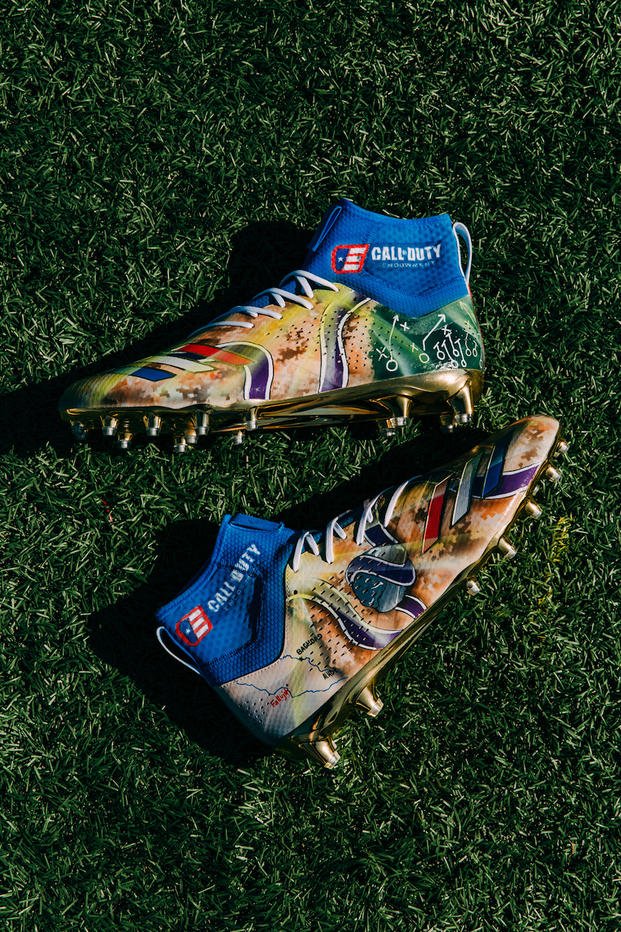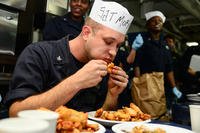Marine Corps Sergeant Myron Ellis, Purple Heart recipient and veteran of Iraq and Afghanistan, was recently honored by the NFL's "My Cause My Cleats" campaign, where players represent hundreds of charitable organizations by wearing in-game customized cleats and gear that are later auctioned off for charity.
Myron was partnered with the Pittsburgh Steelers' wide receiver and active gamer, JuJu Smith-Schuster, through the Call of Duty Endowment, which focuses on helping veterans find high-quality employment. We spoke with Myron about his time in service, his interview for ESPN's NFL Countdown, and his experience with designing his own cleat for the Steelers' game on Dec. 2, 2018.
Where are you from?
I'm originally from Sacramento, California.
What year did you enter service and why did you join?
I entered on March 16th, 2004. At the time, I was going from interview to interview, second interview, third interview, looking for a job. They were telling me I was underqualified, I was overqualified, or they decided to go somewhere else.
I was cleaning my house -- well, cleaning my room, because I was still staying at my parents, and I found three fliers for the Marine Corps. I threw them all away. Then, I put on the TV and on the first three channels I turned to was a Marine Corps commercial. So I was just like, you know what, I got the message, message received. I hopped on the bus and headed down to the recruiter's office.

After joining, was it a bit of a culture shock or did you know what you were getting into? Did you have other family members who had served?
I was not aware that I had prior military family members until after I joined. I had a great uncle who retired as a sergeant major in the Marine Corps. And then my grandfather, he did four years in Vietnam in the Army, but he never talked about his military time until after I got out of boot camp and did my first deployment. Then he opened up about his time in the military; same with my great uncle.
But I did nine months as the poolee, in the Poolee Program, prior to joining, so I spent a lot of time with my recruiters and helping out at the depot and getting a lot of inside information from people who were coming back from boot camp, doing recruiter's assistance, and things like that, so I was picking their brains. I was prepared, but I still wasn't prepared.
How many tours did you do?
I did six tours total. However, I did four combat.
What was your MOS?
I was 0811 Field Artillery to Iraq and to Afghanistan.
Any lessons that stayed with you from your time serving?
The discipline and the preparedness that you come away with after serving in the military. I called myself prepared, I was a prepared person, but after I joined the military … you know, "if you're early, you're on time; if you're on time, you're late" type of mentality.
More respectful than I was, even though I grew up in the church and raised around my grandparents. Discipline, detail-oriented, understanding how to delegate and work as a team.
The understanding of why people do what they do. Understanding that there's more to a project than what is just assigned to you, because everybody has a piece of a pie. Some people's pie is just bigger, so you understand how the vision and the chain of command goes and the structured format that gets you prepared for everyday corporate America life. From what I've seen from my brief time in corporate sectors, they all have a general breakdown that is very similar to the military structure.
And you were a Purple Heart recipient, correct?
Yes, sir.
What is the story behind the Purple Heart? And if you don't want to talk about it, that's fine.
No, I am perfectly comfortable talking about it. I mean I had already talked about it on ESPN, and the whole nation knows.
[laughs] Oh, did you?
Yeah. It was Oct. 11, 2011. On a route clearing mission on Route 611 in Helmand Province by the Kajaki Dam in Afghanistan, I was escorting Afghanistan Army personnel to some forward operating positions and, while I was turning back to check the dispersion, I stepped outside of the clear, the path, the marked path, and I stepped on an IED with my right foot. It was a closed fracture, but I had broke my ankle, tibia/fibula, separated my heel from my foot, and sheared the outside right ankle bone.

How has that affected you?
I maintain a lot. I'm having my third surgery on the 17th of this month [December] and hopefully the end results of that will allow me to be able to run again and have a massive reduction in my day-to-day pain.
I noticed under your LinkedIn that you did volunteer work for the Marine Corps. Can you talk a little bit about that?
Yes, I actually got the Outstanding Volunteer Service Medal from the Marine Corps and I also was awarded the NAACP Community Service Award for my community service that I did while I was in. I volunteered with organizations on-base and off-base, like schools and local community programs, to referee kickball, to be a point of contact or a military liaison for events that are military-themed. Or chaperoning kids, like kids' Halloween parades and things like that.
I also volunteered with a program called TAPS, Tragedy Assistance Program, that helps kids and grieving family members still cope with some of the issues that happen after someone is lost in combat.
Was this before your injury?
It was both, before and after my injury.
Why did you feel compelled to volunteer for that type of work? Was there something that led you to do that?
My grandmother and my mother, they instilled in me to always give back. And if you can do, do help out where you can.
And seeing my first deployment, people were injured and having friends get medically retired and then some friends die in a couple of my deployments, it put a weight on my heart to give back any way I could. Especially when the opportunity to work with an organization called TAPS, Tragedy Assistance Program, came about while I was in Hawaii. I jumped on it because that's just great work, trying to help people cope with loss. You never know how much one life affects another one until you see it through the eyes of a kid.
When did you leave the military? I'm assuming you got out relatively soon after that? It looks like -- oh, you were in until 2015?
Yeah, I got out in 2015. I recovered. I went against the recommendation of a lot of the good people in The Wounded Warrior Program that I was assigned to after my injury. I rehabbed it to the point where I got on full duty. And then, once I got on full duty, I did a B-Billet to security forces.
In 2013, I was assigned to Norfolk, Virginia, and with Charlie Company I went to Guantanamo Bay for four months, where I reinjured my ankle. Shortly after that, when I got back around Thanksgiving time frame, I had surgery again. I believe it was Nov. 26, 2013, I had my second surgery. And that put me on the MEB Board and from there I was medically retired in 2015.
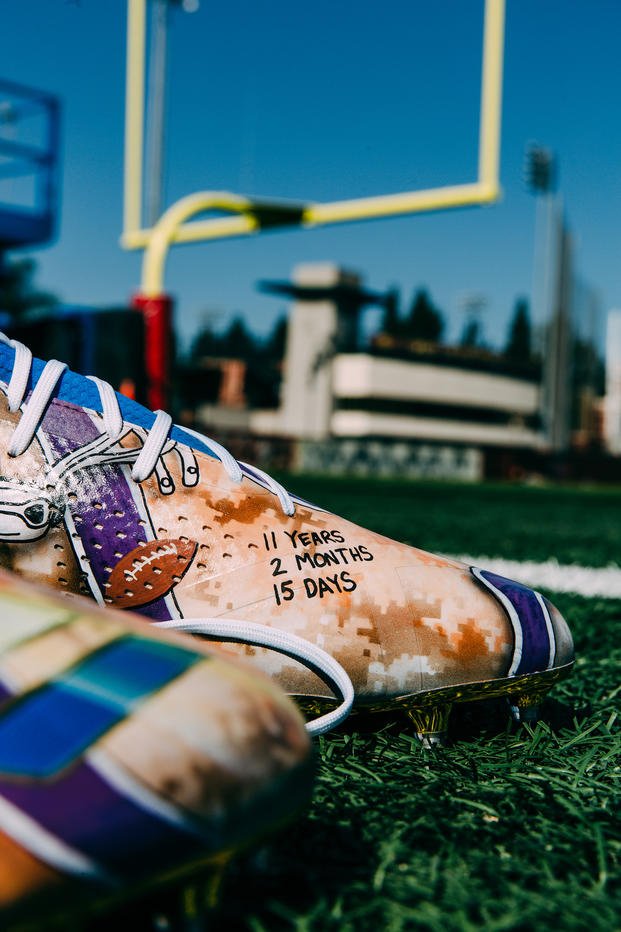
How has it been working with the Department of Veterans Affairs? Have they taken good care of you?
Yes. Actually, I'm actually having my surgery in the VA in Oakland, in Oakland PA, Pittsburgh.
People have so many different experiences with the VA, so that's why I ask.
Yeah, I was lucky. I have friends who weren't as lucky, who didn't understand the resources. You know the mentality, "Closed mouths don't get fed?"
Yes.
I know a number of friends who are hurting and lacking the resources and the things necessary to help them manage day to day with their pain and financially. Lucky for me, I was connected with a number of organizations that helped me get the resources and the aid that I needed, when I needed it.
What would you tell your fellow men and women who served who may be apprehensive to take advantage of those types of organizations?
If you don't utilize the resources that are afforded to you, you're only hurting yourself and your family. It's not weak to ask for help when you need it.
And I had to come to grips with that personally. When I got out, I was upset because I had a goal. In my mind, I was going to retire 20+ years in the Marine Corps as a sergeant major and then here I am 11 years in, getting forced out as a sergeant. Didn't go with my mind frame, so I had to adjust my train of thought and rearrange my focus. And in that, it was a humbling moment to reach out for resources and ask for help.
I did a couple years at 90 percent, where I could have been at 100 percent disability rating and been afforded more resources, but I was prideful and it took me about two years to realize that I needed help, and I needed to ask for help. One of my friends told me that and then, once I did that, even more doors opened for me. The resources were waiting for me, and all I had to do was reach out and ask for them.
So let's get into the NFL's "My Cause My Cleats Campaign" along with the Call of Duty Endowment. How did that play out?
The Call of Duty Endowment partners with veterans organizations that focus on helping veterans find high-quality employment. Call of Duty Endowment was originally founded in 2009, and they had a goal of getting 24,000 veterans placed in high-quality jobs, meaning that they were living above the poverty level, they were doing quality work, they weren't struggling financially to support their family, and it was meaningful and enjoyable work that they were doing. As of now, they are at 50,000 veterans placed in high-quality employment through the organizations that they partner with and they fund. They also have a goal by 2024 to have over 100,000 veterans placed in high-quality positions and companies.
But one of the organizations that the Call of Duty Endowment partners with and funds is CASY, which stands for Corporate America Supports You. I don't know exactly how Call of Duty Endowment signed on with JuJu Smith-Schuster to do the "My Cause My Cleats," but I know he's a big-time gamer and he wanted to pay respect to veterans. They reached out to their organizations, and a representative from CASY unit sent me an email and asked if I was interested in being a part of this endeavor, so I jumped on the opportunity.
Let's talk about the cleats specifically. You worked with Kickasso, right? [Kickasso is an artist based out of Los Angeles who provides custom, hand-painted footwear and clothing to celebrities.]
Yes, he is an amazing gentleman.
Do you happen to know why or how he got involved?
He's worked with JuJu Smith-Schuster in the past to do some custom designs, and they're friends. I guess JuJu reached out to him and said, "Hey, do you want to design some cleats?" And I believe he's done cleats in the last couple years for "My Cause My Cleats" for other athletes.
Did you go meet him to work on the cleats? How did that work out?
A couple of weeks ago, we did the interview at the Steelers' Training Facility in downtown Pittsburgh. Kickasso was there, JuJu Smith-Schuster was there, I was there, along with J Collinsworth, Jac Collinsworth from ESPN.
Prior to the interview and during the interview, I was sharing my story, JuJu was sharing his story, and Kickasso was there listening and taking ideas and stuff like that. We were all brainstorming, and it was a cohesive thought process that came up with the designs for my cleat, which was the right cleat, and JuJu's cleat, which was the left cleat, to tell our individual stories and how they're similar.
It was an amazing brainstorming process. He took it back to his shop down in LA, the thought process and the rough draft, and he took it and he killed it. He got them out to JuJu. I saw the pictures because of Ken, and he sent me an email and JuJu Smith-Schuster was sharing them on Instagram.
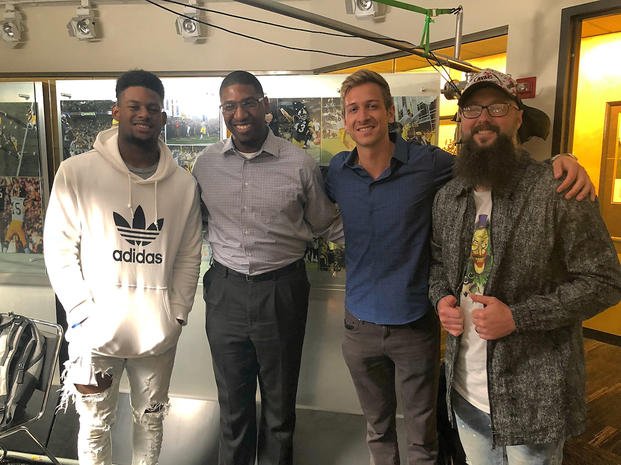
I'm looking at them right now. Incredibly detailed with the dog tags.
Yeah, I saw them in real life on Sunday because I was invited to the game, a Sunday night game, where he wore him. I was able to meet JuJu Smith-Schuster prior to the game. He was wearing the gloves and the cleats, and he showed them to me. It was just awesome to see him and how they embodied our individual stories and paid homage to our past, specifically my military experience, my wife, and to myself, receiving the Purple Heart.
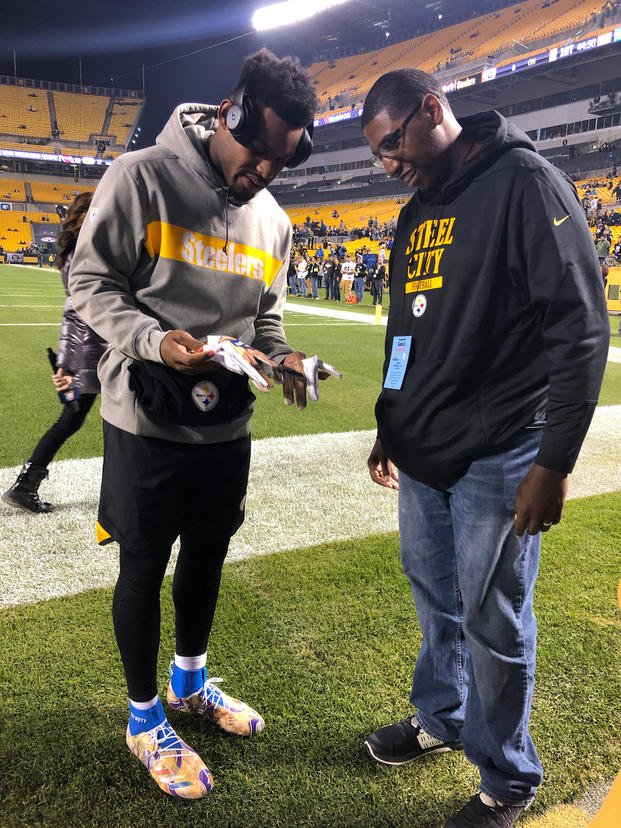
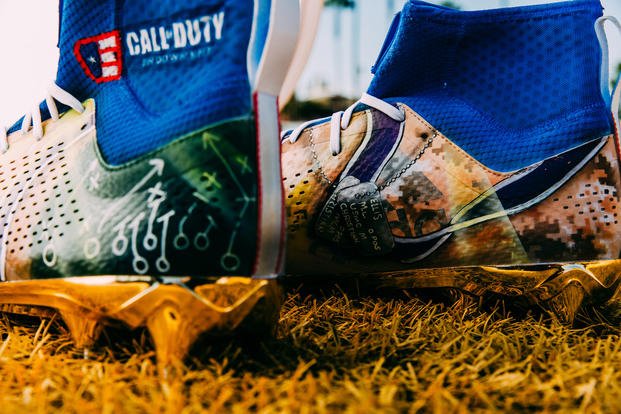
Are the gloves customized to match those two opposing sides, your story and his?
I don't believe the gloves tell his story, but I know they have the Purple Heart ribbon running through them to symbolize my story and they have the camo Afghanistan-type feel, same as my cleat. I don't know if they're telling his story as well, but they're representing my story.
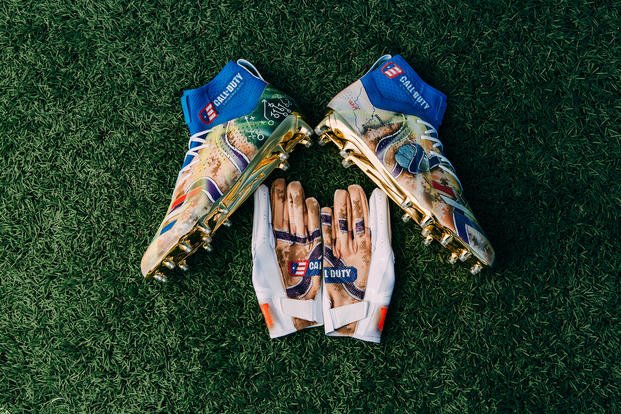
Do you have the cleats right now or no? Do they give you those or are they somewhere else?
No, I wish I had a pair of those cleats and the gloves, but the cleats actually went on auction immediately following the game as part of the ESPN Cancer Charity. There were auctions for the Jimmy V Foundation and things like that for charitable causes. Those cleats were donated along with cleats from other athletes that supported a cause on this day, on Sunday. They all went on auction after the game.
Did they already complete the auction? Do you know yet or not sure?
I don't know because I don't make enough money to even be in that conversation [laughs]. I think the starting bid was like $500.
Wow. That's cool, though.
Yeah, those cleats went for a couple thousand dollars, easy. Because in my personal opinion, I may be a bit biased, but those are the best cleats for "My Cause My Cleats" this year, hands down.
That's a bold claim, but you might be correct. I think the ribbon on it is amazing. It looks really good.
They had the personal touch of the story.
Absolutely. And the dog tags, they actually have your name on it, right? I tried to zoom in there, but it looked like it said Ellis on the side of it?
Yeah, they had everything except for my Social Security on there. They did great work. He did such a great job representing my story, putting in the Call of Duty Endowment, and telling JuJu's story.
You said something about your wife was on the cleat as well, in some capacity?
Yes.
Can you explain that?
Yes, throughout my injury and the transitioning me out of the military and my deployment, my wife was my rock. She always had my back, and she always kept me focused and kept me -- you know when I was swaying, she got me back in line. She's always been my rock. And so on my cleat, the right cleat, there's a gray rock which symbolizes my wife and the banner goes around the rock to pay homage to her.
Beautiful.
At my darkest moments, too, my military service, she was there to support me and have my back and be the rock I needed.
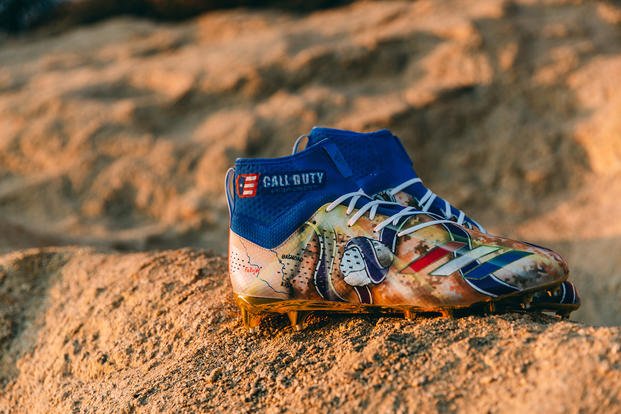
I love it. Now, you were saying that your story with JuJu was somewhat similar. Can you tell me what you meant by that?
Well, we're both from California. Now, we're both living out here, but also we were both fortunate enough to work in a job that we loved at a young age.
You know as an athlete and as a military combat vet, you understand that at any given moment your career could be over due to injury. Unfortunately, it happened for me and, hopefully, Lord willing, it won't happen for JuJu and he can have a full career and head into the Hall of Fame with a couple of rings.
And the teamwork, the similarities in how the football players and the military work as a team. You know everybody is on the field as a leader, just like in the Marine Corps. Every Marine is a rifleman and a natural leader. At any given point, the lowest-ranking individual could go to the senior veteran, the senior sergeant, and give him some words of encouragement if he sees him having a bad moment, giving him some words of wisdom, and vice versa. Even though we all know that Antonio Brown is the #1 receiver out there in the league right now and on the Steelers, if he's having a bad game, JuJu Smith-Schuster could feel comfortable enough to walk up to him and whisper in his ear, give him some words of encouragement, and get him back in the right mind frame, as true teammates do. And so that's the similarity.
Was that pretty wild being interviewed by ESPN? I would imagine that was pretty intense.
Yes, it was amazing whirlwind of experience. We did the tour of the training facility, I got to take some photos and talk to Mike Tomlin [Pittsburgh Steelers' head coach] for a hot second, took some photos with him. Took some photos behind the podium in the pressroom. You know it was fun. Met JuJu, which was amazing. Got to see the trophies, and it was an amazing experience.
What's next for you? I know there's the rehab. What are you studying and how long until you finish grad school?
I'll be focusing on rehab and grad school at the same time. Studying human resources with a concentration in strategic leadership. This is my first semester, so probably the Fall 2020. But what's next for me is spend[ing] more time with my daughter, who turns one on this Saturday. So spend some time with her and focus on school and family, the family life.
Anything else you want to add?
The Call of Duty Endowment does great work for veterans. If any veteran has an opportunity to work or partner with an organization that works with the Call of Duty Endowment or the Call of Duty Endowment itself, do it. It is a worthwhile opportunity, and they do great work for veterans.
Are they going to follow up with you too? I don't know how that works after the fact. Do you have contacts over there?
I don't know what's next through the Call of Duty Endowment. I know I'm still working with their organization that they fund, CASY, Corporate America Supports You, but I'm just not in the job hunt right now. But every time I have anything happen on my resume, I reach out to them to help me rework my resume, to make sure I keep it tailored for the jobs down the line when we're ready to get back out in the job hunt.
